|
|
|
Sort Order |
|
|
|
Items / Page
|
|
|
|
|
|
|
| Srl | Item |
| 1 |
ID:
097835
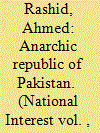

|
|
|
|
|
| Publication |
2010.
|
| Summary/Abstract |
THERE IS perhaps no other political-military elite in the world whose aspirations for great-power regional status, whose desire to overextend and outmatch itself with meager resources, so outstrips reality as that of Pakistan. If it did not have such dire consequences for 170 million Pakistanis and nearly 2 billion people living in South Asia, this magical thinking would be amusing.
|
|
|
|
|
|
|
|
|
|
|
|
|
|
|
|
| 2 |
ID:
097833
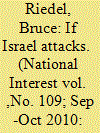

|
|
|
|
|
| Publication |
2010.
|
| Summary/Abstract |
IN A secret special national intelligence estimate (SNIE) in 1960, the American intelligence community concluded that "possession of a nuclear weapon capability . . . would clearly give Israel a greater sense of security, self-confidence, and assertiveness." For almost half a century since, Israel has possessed a nuclear-weapons monopoly in the Middle East, a monopoly it has fought hard to preserve.
|
|
|
|
|
|
|
|
|
|
|
|
|
|
|
|
| 3 |
ID:
097836
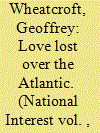

|
|
|
|
|
| Publication |
2010.
|
| Summary/Abstract |
IN MARCH 2001, the once youthful but now veteran Tory politician William Hague gave a speech at a Conservative Party conference in which he banged the anti-European drum. In March 2003, he gave another speech, in Parliament, in which he warmly endorsed Tony Blair's support for the American invasion of Iraq. In July 2010, he spoke once more, this time in the celebrated Locarno Room at the Foreign Office. But his tune had changed: like Prime Minister David Cameron, now-Foreign Secretary Hague has intimated that he seeks to distance Britain from reflexive support for Washington, and he says that, in a new multipolar world, he wants to move more generally from an obsession with the "blocs"-the United States, Europe and the Middle East-to forge fresh links with such emerging powerhouses as India, China and Brazil.
|
|
|
|
|
|
|
|
|
|
|
|
|
|
|
|
| 4 |
ID:
097834
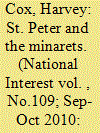

|
|
|
|
|
| Publication |
2010.
|
| Summary/Abstract |
URBI ET Orbi ("for the city and for the world") is the traditional blessing the pope offers on special occasions. Although he has at times pronounced it in other venues-St. John Lateran, the pope's official ecclesiastical seat, or the Quirinale, now the Italian president's residence-the pontiff usually intones the prayer from the balcony overlooking St. Peter's Square. The ancient ceremony reminds us that the pope holds office as head of the Church because he has been elected bishop of "the city," Rome; that he is the leader of a global organization whose very name, "Catholic," means universal (making the whole world his parish); and that he is the head of a miniscule but internationally recognized sovereign state.
|
|
|
|
|
|
|
|
|
|
|
|
|
|
|
|
| 5 |
ID:
097837
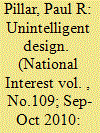

|
|
|
|
|
| Publication |
2010.
|
| Summary/Abstract |
THE POST of director of national intelligence (DNI) has had an unhappy five-year history. Until now it has been easier to blame the successive occupants of the position than to acknowledge the fundamental flaws of the office. Much commentary about the recent ouster of Dennis Blair, for example, has focused on his lack of chemistry with the president, his riling of the Israel lobby by attempting to appoint Chas Freeman to head the National Intelligence Council and a deficiency in political street-fighting skills compared to those of CIA Director Leon Panetta. All those no doubt contributed to Blair's troubles. But one indication that the principal problems are those of the office rather than the occupant is that the job, in such a short time, has now chewed up three able public servants, each of whom excelled in their principal professions (the diplomatic service in the case of the first DNI, John Negroponte, and the military in the cases of Blair and his predecessor, Mike McConnell). More telling still is the difficulty in persuading other able people to take the job. Reportedly, the first to refuse was the future secretary of defense, Robert Gates, one of the most adept officials in Washington at protecting his own reputation; he can certainly recognize a losing hand when he sees one.
|
|
|
|
|
|
|
|
|
|
|
|
|
|
|
|
|
|
|
|
|